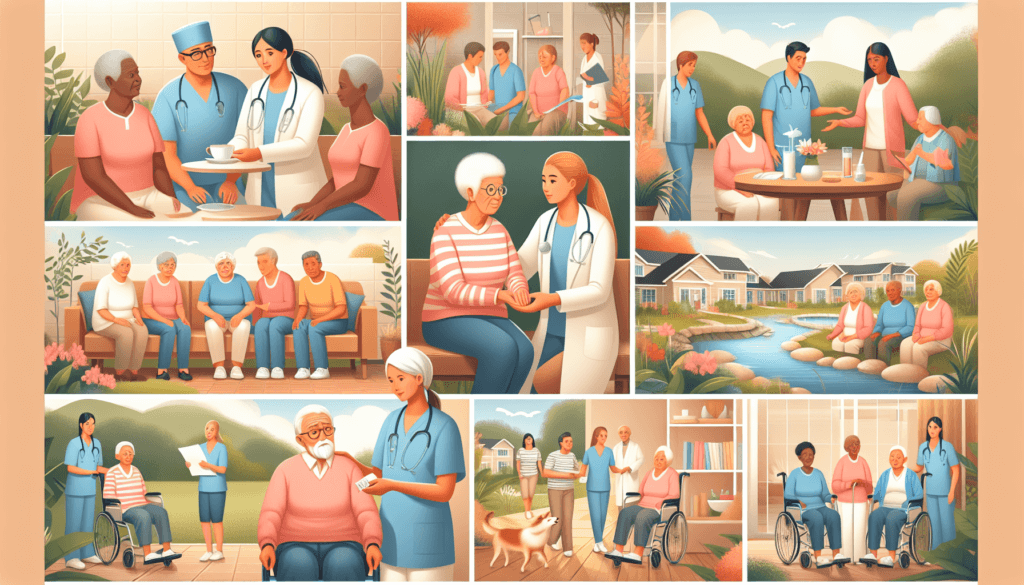Are you a senior in need of support? Look no further! This article provides a comprehensive overview of the most popular resources available to seniors in need. Whether you require assistance with healthcare, financial aid, social connections, or housing, we’ve got you covered. From government programs to non-profit organizations, there are a plethora of options tailored specifically to meet the needs of seniors. Take a stroll through this article to discover the best resources that can lend you a hand and enrich your golden years.

Healthcare Services
Elderly Care Facilities
Elderly care facilities, also known as assisted living facilities or nursing homes, provide comprehensive care and support for older adults who may need assistance with daily activities or medical supervision. These facilities offer a safe and comfortable environment where seniors can receive personalized care from trained professionals. Services provided in elderly care facilities may include assistance with bathing, dressing, medication management, and meal preparation. Additionally, residents have access to social activities and 24-hour emergency assistance.
Home Healthcare Services
Home healthcare services aim to provide medical care and support to seniors in the comfort of their own homes. These services are particularly beneficial for older adults who prefer to age in place or those who require specialized medical attention. Home healthcare professionals, such as nurses, therapists, and aides, deliver a range of services, including wound care, medication management, physical therapy, and assistance with daily activities. By receiving healthcare services at home, seniors can maintain their independence while receiving the necessary support to stay healthy and well.
Geriatric Clinics
Geriatric clinics are specialized medical facilities that focus on the healthcare needs of older adults. These clinics typically have a team of healthcare professionals who are trained in geriatrics and understand the unique challenges and conditions associated with aging. Geriatric clinics offer comprehensive medical assessments, preventive care, disease management, medication reviews, and coordination of care. The goal of these clinics is to optimize the health and well-being of older adults by providing personalized and age-appropriate healthcare services.
Medical Alert Systems
Medical alert systems are devices that provide instant access to emergency assistance in the event of a fall, medical emergency, or any other urgent situation. These systems typically consist of a wearable button or pendant that can be activated to connect the user with a monitoring center. Once activated, the monitoring center can assess the situation and dispatch the appropriate help, whether it be emergency medical services or contacting a designated caregiver. Medical alert systems provide peace of mind to both seniors and their loved ones, ensuring that help is always just a button press away.
Financial Assistance
Social Security Benefits
Social Security benefits provide financial support to retired seniors who have paid into the Social Security system throughout their working years. These benefits are designed to help older adults maintain a basic standard of living in their retirement years. The amount of Social Security benefits received is based on factors such as the individual’s work history and the age at which they choose to start receiving benefits. Social Security benefits serve as a crucial source of income for many older adults, helping to cover essential expenses such as housing, healthcare, and daily living costs.
Medicare and Medicaid
Medicare and Medicaid are federal government programs that provide healthcare coverage for older adults and individuals with low income. Medicare is available to individuals aged 65 and older, as well as some younger individuals with certain disabilities. It covers a range of medical services, including hospital stays, doctor visits, prescription drugs, and preventive care. Medicaid, on the other hand, provides healthcare coverage to low-income individuals of all ages, including older adults. It helps cover medical expenses such as doctor visits, hospital stays, long-term care, and prescription medications.
Supplemental Security Income (SSI)
Supplemental Security Income (SSI) is a monthly cash benefit provided to older adults with limited income and resources. This program is administered by the Social Security Administration and is intended to assist individuals who are aged 65 and older, blind, or disabled. SSI benefits help to cover basic needs such as food, shelter, and clothing. The amount of SSI benefits received is determined by factors such as income, resources, and living arrangements.
Low-Income Home Energy Assistance Program (LIHEAP)
The Low-Income Home Energy Assistance Program (LIHEAP) is a federal program that aims to assist low-income households, including older adults, with their energy bills. Through LIHEAP, eligible individuals can receive financial assistance to offset the costs of heating and cooling their homes. This program helps ensure that older adults can maintain a safe and comfortable living environment without the burden of high energy costs. LIHEAP benefits are typically available on a first-come, first-served basis and are based on income and household size.

Transportation Services
Public Transportation
Public transportation systems, such as buses, trains, and trams, provide a convenient and affordable means of transportation for older adults. These services offer routes that connect various neighborhoods, communities, and destinations, allowing seniors to travel independently and access essential services and activities. Public transportation is often equipped with features to accommodate individuals with mobility challenges, such as wheelchair ramps, priority seating, and audio announcements. Seniors can benefit from reduced fares, monthly passes, and other discounts specifically designed for older adults.
Paratransit Programs
Paratransit programs are specialized transportation services that cater to the needs of individuals with disabilities or mobility limitations, including older adults. These programs provide door-to-door transportation, allowing seniors to travel safely and comfortably to medical appointments, social engagements, and other important destinations. Paratransit vehicles are typically equipped with features such as wheelchair lifts, ramps, and secure seating. Seniors can typically schedule rides in advance, ensuring that they have reliable transportation at their convenience.
Senior Rideshare Programs
Senior rideshare programs are initiatives that connect older adults with volunteer drivers who can provide transportation services. These programs utilize technology platforms or community-based networks to match seniors with willing drivers in their area. Volunteer drivers offer rides to medical appointments, grocery stores, social events, and other necessary destinations. Senior rideshare programs can be an excellent option for older adults who do not have access to a personal vehicle or require additional assistance during transportation. These programs promote social interaction and provide a reliable means of transportation for seniors.
Home Modifications and Assistive Devices
Ramp Installation
Ramp installation involves modifying the entrances of homes to provide seniors with easier access and facilitate mobility. Ramps can be constructed from various materials, such as wood, aluminum, or concrete, and are designed to meet individual needs and requirements. Installing ramps can eliminate the need for navigating stairs, making it safer and more convenient for older adults to enter and exit their homes. Ramps can be customized to fit different entryway configurations and can accommodate mobility aids such as wheelchairs, walkers, and scooters.
Grab Bars and Handrails
Grab bars and handrails are essential safety features that can be installed in bathrooms, staircases, and other areas of the home to assist seniors with balance and stability. These fixtures provide support while standing, sitting, or maneuvering through different spaces, reducing the risk of falls and accidents. Grab bars are typically mounted to walls and come in various lengths and designs to best suit the needs of seniors. Handrails, on the other hand, are commonly found alongside staircases and provide a continuous support system for navigating steps safely.
Stairlifts and Elevators
Stairlifts and elevators are mechanical devices that can be installed in homes to assist seniors with mobility challenges in navigating multiple floors. Stairlifts are designed to transport individuals up and down staircases smoothly and safely. They consist of a chair or platform that moves along a rail attached to the stairs. Elevators are larger systems that can transport both individuals and bulky items between different levels of a home. Stairlifts and elevators can significantly enhance accessibility for older adults, allowing them to remain independent and avoid the need to relocate to a single-story dwelling.
Walk-in Tubs and Showers
Walk-in tubs and showers are specially designed bathing fixtures that provide seniors with a safer and more accessible bathing experience. These fixtures typically have a low threshold or no-step entry, eliminating the need to lift legs over the side of a traditional bathtub. Walk-in tubs are equipped with handrails, non-slip flooring, and built-in seating, allowing older adults to bathe comfortably and securely. Walk-in showers feature roll-in access, grab bars, and adjustable showerheads to accommodate individuals with mobility limitations. These modifications can help prevent accidents and support seniors in maintaining their personal hygiene.

Meals and Nutrition Support
Meals on Wheels
Meals on Wheels is a nationwide program that delivers nutritious meals to homebound seniors who are unable to prepare their own meals or access meal services. The program utilizes a network of volunteers who deliver meals directly to the homes of eligible seniors. Meals on Wheels offers a variety of meal options, including specialized diets for individuals with specific health conditions. In addition to providing nourishment, Meals on Wheels also serves as a valuable source of social interaction for seniors, as volunteers often engage in friendly conversations during their visits.
Congregate Meal Programs
Congregate meal programs are community-based initiatives that provide older adults with the opportunity to enjoy nutritious meals in a social setting. These programs typically operate in senior centers, community centers, or other designated locations where seniors can gather to share meals and engage in social activities. Congregate meal programs offer a valuable opportunity for older adults to connect with peers, make new friends, and combat social isolation. The meals served are often balanced, meeting dietary guidelines and providing seniors with essential nutrients.
Food Pantries
Food pantries are resource centers that distribute food and groceries to individuals and families in need, including older adults. These pantries provide access to a variety of non-perishable food items, fresh produce, and other essential household goods. Food pantries can be a valuable resource for seniors who are facing financial constraints or need assistance in acquiring nutritious food. Many food pantries also offer specialized programs for seniors, such as low-sodium or diabetic-friendly food options to support their unique dietary needs.
Senior Farmer’s Market Nutrition Program
The Senior Farmer’s Market Nutrition Program (SFMNP) is a federally funded program that enables eligible seniors to access fresh fruits, vegetables, and herbs from participating farmers’ markets and roadside stands. SFMNP aims to improve the health and nutrition of seniors by increasing their consumption of locally grown produce. Participants receive vouchers or coupons that can be redeemed for eligible food items, providing them with greater access to fresh and nutritious options. SFMNP not only supports seniors’ dietary needs but also promotes the engagement and support of local farmers.
Legal and Advocacy Services
Elder Law Attorneys
Elder law attorneys specialize in legal matters that specifically impact older adults, such as estate planning, long-term care planning, guardianship, and healthcare decision-making. These attorneys have in-depth knowledge of the legal complexities surrounding aging and can provide guidance and representation to seniors seeking assistance with these matters. Elder law attorneys can help older adults navigate through legal documents, plan for their future, protect their assets, and ensure their wishes are upheld. Their expertise in the field allows them to tackle legal issues unique to older adults effectively.
Legal Aid Organizations
Legal aid organizations offer free or low-cost legal assistance to individuals who cannot afford the services of a private attorney. These organizations provide a valuable resource for older adults who may require legal representation or guidance but are unable to afford traditional legal fees. Legal aid organizations typically have a team of attorneys and legal professionals who specialize in various areas of law, including those relevant to aging and older adults. By seeking assistance from legal aid organizations, seniors can access the legal support they need without experiencing financial hardship.
Long-Term Care Ombudsman Program
The Long-Term Care Ombudsman Program is a state-based advocacy program that aims to protect the rights and well-being of residents in long-term care facilities, such as nursing homes and assisted living facilities. Ombudsmen are trained advocates who work to investigate and resolve complaints made by residents or their families regarding the quality of care or quality of life in these facilities. They provide a voice for older adults and help ensure their rights are upheld. The Long-Term Care Ombudsman Program plays a vital role in safeguarding the welfare of seniors residing in long-term care settings.
Senior Medicare Patrol (SMP)
The Senior Medicare Patrol (SMP) program is a national initiative that educates and empowers seniors to detect and report Medicare fraud, errors, and abuse. SMP volunteers receive training and resources to assist them in identifying suspicious activities related to Medicare billing, insurance scams, and identity theft. By equipping older adults with the knowledge and tools to protect themselves, the SMP program helps prevent financial exploitation and promotes the efficient and appropriate use of Medicare resources. Seniors can play an active role in safeguarding the integrity of the Medicare program and their own healthcare benefits.

Counseling and Emotional Support
Senior Helplines
Senior helplines provide confidential and compassionate support to older adults who may be in crisis, experiencing loneliness, or seeking emotional assistance. These helplines are typically staffed by trained professionals who offer a listening ear, guidance, and resources to seniors in need. Senior helplines can be accessed via telephone, and conversations are kept confidential. Whether a senior is feeling overwhelmed, anxious, or simply wants someone to talk to, senior helplines provide an essential outlet for emotional support and can serve as a vital lifeline for those in distress.
Support Groups
Support groups bring together individuals who share common experiences or challenges, creating a supportive and understanding community. For older adults facing specific issues, such as caregiving, grief, chronic illness, or mental health concerns, support groups can provide a safe space to share experiences, learn from others, and gain coping strategies. These groups are facilitated by professionals or peers who provide guidance and foster a sense of belonging. Seniors in support groups often find comfort, validation, and encouragement from others who have faced similar situations.
Elder Abuse Hotlines
Elder abuse hotlines are dedicated phone lines that provide immediate assistance, guidance, and reporting options for seniors who are victims of abuse, neglect, or exploitation. These hotlines are staffed by professionals who are trained in recognizing and responding to cases of elder abuse. When older adults are in distress or fear for their safety, these helplines can offer crucial intervention, connection to protective services, and access to legal resources. Elder abuse hotlines play a critical role in ensuring the safety and well-being of vulnerable seniors who may be at risk of harm.
Counseling Services for Older Adults
Counseling services specifically tailored for older adults offer professional mental health support to seniors who are facing emotional challenges, life transitions, or mental health issues. These services are typically provided by licensed psychologists, social workers, or counselors who have expertise in geriatric mental health. Counseling sessions may address concerns such as anxiety, depression, grief, relationship problems, or adjustment to retirement or changes in health. Through counseling, older adults can gain insight, develop coping strategies, and find support in navigating the complexities of aging.
Recreational and Social Activities
Senior Centers
Senior centers are community-based facilities that offer a wide range of recreational, social, and educational opportunities for older adults. These centers often provide a hub for socialization, learning, and engagement, offering activities such as exercise classes, art and craft workshops, games, and group outings. Senior centers promote a sense of community, encourage physical and mental well-being, and combat social isolation among older adults. They serve as vibrant gathering spaces where seniors can connect with peers, form friendships, and discover new interests.
Senior Fitness Programs
Senior fitness programs cater specifically to the physical well-being of older adults, providing exercise opportunities that are tailored to accommodate various fitness levels and abilities. These programs may include activities such as chair exercises, yoga, tai chi, water aerobics, or strength training. Senior fitness programs are designed to improve flexibility, strength, balance, and overall physical health, reducing the risk of falls and promoting independence. These programs offer a supportive and inclusive environment where older adults can prioritize their fitness and well-being.
Arts and Crafts Classes
Arts and crafts classes for older adults foster creative expression, cognitive stimulation, and social interaction. These classes offer opportunities to explore different artistic mediums such as painting, pottery, jewelry making, or writing. Participating in arts and crafts can promote relaxation, reduce stress, and enhance self-esteem for seniors. Additionally, these classes often provide a platform for collaboration and socialization, allowing older adults to connect with others who share similar interests and passions. Arts and crafts classes are an excellent way for seniors to explore their creativity and discover new talents.
Volunteer Opportunities
Volunteer opportunities for older adults allow seniors to contribute their skills, time, and experience towards meaningful causes in their communities. Volunteering not only benefits the organizations and individuals being served but also provides numerous benefits for the seniors themselves. Engaging in volunteer work can promote a sense of purpose, increase social connections, and improve overall well-being. Seniors can choose from a wide range of volunteer opportunities, such as tutoring, mentoring, assisting at food banks, supporting local charities, or participating in community clean-ups. Volunteering allows older adults to make a positive impact and remain active contributors to society.

Educational and Learning Programs
Senior Learning Centers
Senior learning centers provide older adults with opportunities for continued education and personal development. These centers offer a variety of classes and workshops covering a range of subjects, such as history, literature, technology, foreign languages, and art. Senior learning programs enable older adults to foster intellectual curiosity, stay mentally active, and acquire new skills and knowledge. Whether seniors are interested in exploring different cultures, learning a new language, or enhancing their computer literacy, senior learning centers provide a supportive and enriching environment for lifelong learning.
Online Courses for Older Adults
Online courses specifically designed for older adults offer flexible and accessible learning opportunities via the internet. These courses cover a range of topics and can be accessed from the comfort of one’s own home. Online learning allows seniors to engage with educational materials, participate in discussions, and complete assignments at their own pace. Older adults can explore various subjects of interest, from history and science to literature and photography. Online courses cater to different learning styles and provide a convenient means for seniors to continue their education or pursue new areas of interest.
Educational Workshops
Educational workshops provide older adults with focused learning experiences on specific topics of interest or practical skills. These workshops are typically led by professionals or experts in the field and offer opportunities for interactive learning, skill-building, and discussion. Educational workshops may cover subjects such as financial planning, technology basics, healthy cooking, stress management, or creative writing. By participating in workshops, older adults can gain valuable knowledge and tools to enhance their daily lives, foster personal growth, and stay engaged with emerging trends and best practices.
Technology Resources
Senior-friendly Smartphones
Senior-friendly smartphones are designed with features that cater to the unique needs and preferences of older adults. These smartphones typically have larger buttons, simplified interfaces, and accessibility options that make them easier to use and navigate. Senior-friendly smartphones often include features such as enhanced volume control, hearing aid compatibility, and emergency assistance buttons. They may also come preloaded with useful apps that promote health tracking, medication reminders, or virtual communication. Senior-friendly smartphones allow older adults to stay connected with loved ones, access information, and embrace the benefits of technology.
Tablets and Laptops for Seniors
Tablets and laptops designed for seniors provide portable and user-friendly options for accessing the internet, email, and various applications. These devices offer larger screens, intuitive interfaces, and simplified setups to accommodate older adults who may be less familiar with technology. Tablets and laptops for seniors often include features such as touchscreens, voice recognition, and adjustable font sizes. With these devices, seniors can browse the web, shop online, communicate with family and friends, and engage with digital content such as books, movies, and games. Tablets and laptops empower older adults to enjoy the benefits of technology on their own terms.
Digital Literacy Classes
Digital literacy classes aim to teach older adults fundamental computer skills, internet navigation, and basic software applications. These classes provide hands-on training and guidance to seniors who may have limited experience or feel hesitant about using technology. Digital literacy classes cover topics such as using email, browsing the internet safely, conducting online research, and utilizing common software programs. By building digital literacy skills, older adults can stay connected with others, access information, manage online accounts, and take advantage of various online resources. These classes enable seniors to overcome barriers to technology and enhance their digital engagement.
In conclusion, older adults have access to a wide range of resources and support services tailored to their unique needs and challenges. From healthcare and financial assistance to transportation, home modifications, and emotional support, the comprehensive article highlights various avenues through which seniors can find the help and resources they require. Whether it is receiving medical care, accessing financial benefits, or engaging in social and recreational activities, these resources aim to enhance the well-being and quality of life for older adults. By exploring these resources and taking advantage of the available support, seniors can navigate the complexities of aging with greater confidence, support, and dignity.


